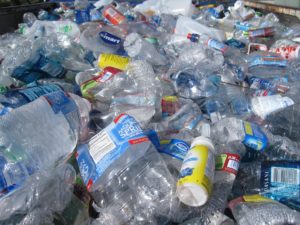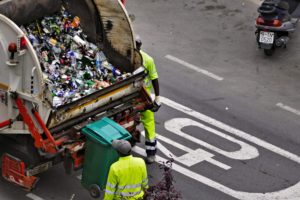Feature: Greater Manchester’s disjointed approach to recycling
Kerbside plastic recycling isn’t always economical – but it’s a vital part of encouraging manufacturers to develop more sustainable packaging. Journalist Steven Oldham explores why we need a joined-up approach to recycling.
A growing number of councils are collecting different types of plastic for recycling, from soup containers to cling film.
However, the differing council policy can be highlighted in Greater Manchester – a city region joined politically to elect a metro mayor, but divided by approaches to recycling and waste management.
Wigan residents can leave margarine tubs, yoghurt pots and some other plastics for kerbside recycling collection.
However, in the other nine Greater Manchester boroughs, councils only collect plastic bottles.
Consumers in these areas have to proactively seek out private schemes, such as recycling carrier bags and plastic wrapping at supermarkets or using Terracycle drop-off points for items such as biscuit wrappers and crisp packets.

Cllr Paul Prescott, portfolio holder for environment at Wigan Council, said: ‘We are proud that Wigan Council is leading the way on recycling plastic other than bottles as part of its kerbside recycling services.
‘While on paper the difference made to recycling rates is only very small due to the fact that pots, tubs and trays are very light, we know that we have a significant role to play in linking producers, residents and recyclers.
‘To motivate producers to redesign plastics to make them recyclable, we have to collect them.
‘This is definitely a service that our residents want us to provide, and we are pleased that we are able to play our part in line with our wider work and ambitious targets on the environment and climate change.’
Cllr Prescott’s comments about the small impact of extra plastic on recycling rates are reinforced by the DEFRA league table – despite only collecting bottles, Stockport (58.5%) and Trafford (56.9%) councils recycle a higher percentage of their total waste than Wigan (52.8%).
Three Rivers District Council in Hertfordshire topped the table with 64.1%. The current economic value of recycling this type of plastic is negatable, with the cost often outweighing the sale price.
Sometimes, there is simply no market for these low-grade plastics as only bottles can be reused to make food packaging. Other recycled plastic can only be turned into rigid items like crates or trays.
Plastic placed into non-recyclable waste around Greater Manchester is taken to be burnt and converted into electricity at an energy recovery facility in Runcorn.
In a time where we are all thinking about sustainability and trying to use fewer products containing single-use plastic, it’s clear that manufacturers hold a key role in combatting the problem.
Beginning in April 2022, the Government will introduce a new tax on any plastic packaging made of less than 30% recycled material.
It is hoped this direct attempt to encourage manufacturers to use recycled material will boost demand for recycled plastic, in turn driving up the price, and making kerbside collections more viable.
Manufacturers who produce or import packaging with less than the required 30% recycled material will be charged £200 per tonne – a cost that could soon mount up for high volume operators.
Müller UK & Ireland are the country’s leading yoghurt manufacturer and are making efforts to improve their environmental practices. A spokesperson told Environment Journal: ‘Shoppers want great-tasting dairy products in packaging that assures safety, protects the product and is recyclable, so we are working very hard to realise our ambition that all of our products will use packaging which is 100% recyclable or reusable by 2025.
‘Our fresh milk bottles, which are made from up to 40% recycled material are 100% recyclable, as are our FRijj milkshake bottles, which are made from 51% recycled material.
‘In the last 12 months, we have changed our big pot yoghurts to material that is 100% recyclable and two of our biggest recent NPD launches, Müller Corner Icelandic Style Skyr and Müllerlight Skyr, are both in 100% recyclable pots.’
Now with both a financial and ethical incentive to produce and use greener packaging, it’s no surprise that big companies are looking to change their ways. It remains to be seen if more Greater Manchester councils will follow Wigan’s lead and invest in more plastic recycling technology as the new regulations come into play.













